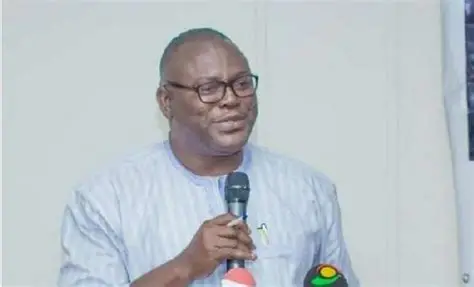Published
10 minutes agoon
By
Adubianews
While public officials are often blamed for corruption in Ghana, Associate Professor at the University of Ghana School of Law, Prof. Abdallah Ali-Nakyea, is shifting attention to the private sector. He insists that businesses are major enablers of public sector corruption and must be held to firm ethical standards to curb the menace effectively.
Speaking at a high-level forum on corruption held at the Alisa Hotel on Thursday, June 26, and organised by the Media Foundation for West Africa (MFWA), Prof. Ali-Nakyea stressed that integrity in private business is just as essential as accountability in public office.
“The private sector should adopt ethical practices and principles,” he said. “Many companies benefit directly from state contracts yet operate without regard for transparency or integrity.”
He called on the government to adopt a zero-tolerance approach toward unethical corporate behaviour by barring offending companies from future contracts.
“Government should make it in such a way that if you are caught with any unethical practices, you are blacklisted. You should not get any government contract,” he insisted.
“Government is the biggest buyer, biggest supplier, and biggest employer. All the private sector jobs are coming from the government. Why can’t we blacklist unethical businesses so that we can promote the good ones?”
Prof. Ali-Nakyea also decried the limited financial oversight and overreliance on external institutions, arguing instead for building robust local systems to fight corruption and illicit financial flows.
“The banking system needs checks and monitoring,” he stated. “And then the international organisations, I keep saying at such fora, we do not need loans, we do not need handouts. Help us strengthen. You see how we could’ve saved 5 billion from corruption, 2 billion from illicit flows from mining. Do we need to borrow?”
On legal reform, he urged amendments to Ghana’s anti-corruption laws to ensure that ill-gotten wealth is fully recovered and offenders face both legal and reputational penalties.
“Let’s amend anti-corruption laws to close the loopholes identified. We should have provisions for the recovery of funds. I believe in name, recover, and punish,” he said.
“If you name, recover, and punish, the result is shame. But if you name, punish, and don’t recover, then nothing has been done. They will continue, hoping they will not be caught.”
He further called for tougher sanctions and improved whistleblower protection to encourage more citizens to report corruption.
“We need stricter penalties for offenders. We need stronger whistleblower protection, and these are some recommendations,” he concluded.
The MFWA forum, themed “Hidden Riches, Hollow Laws: Dissecting the Loopholes That Fuel Corruption and Illicit Financial Flows,” brought together stakeholders from academia, civil society, and the legal fraternity to discuss sustainable reforms in Ghana’s anti-corruption efforts.

























